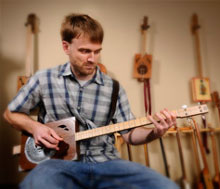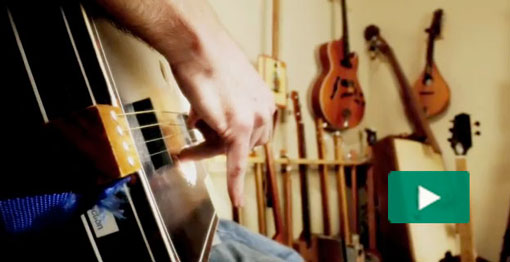UAB Physician Pulls His Own Strings
By Caperton Gillett
 |
Click on the "play" button above to hear a clip of "From the Forest a Child" from Kirk Withrow's Lullaby CD. To hear more samples from Withrow's cigar-box guitars, click here. |
UAB head and neck surgeon Kirk Withrow, M.D., doesn’t stop operating when he gets home from work. His patients are a little smaller, however—and possibly more aromatic. Withrow finds his muse in cigar boxes of all sizes and shapes, which he turns into guitars that he gives away and plays himself.
UAB Magazine: How did you get interested in making cigar-box guitars?
Withrow: It was actually one of my patients who got me started. I began playing the banjo when I was 21, but during my residency I didn’t play that much. While I was on call one night—the funny thing is I had tried really hard to switch with someone else that night—a patient came in who was a cabinetmaker. He stuck around for three or four days, and over that time we talked about music. When he mentioned the idea of a cigar box guitar, I had no idea what he was talking about. But when he came back to see us at the clinic, he brought me one. I started making them and playing them, and that’s really all I play now.
Where do you get the boxes?
Mostly from cigar stores. At one store the lady actually knew which boxes would probably work well and would save them for me. The boxes are always empty when I get them. Come to think of it, I don’t actually think I have ever really smoked a cigar. (Story continues below the video)
Does a cigar-box guitar sound like a traditional guitar?
For the most part, it sounds a little more tinny, like a banjo. When you put electronics in it, though, it can sound just like a guitar, and you wouldn’t know the difference. But even if you find a huge cigar box, it’s going to be a whole lot smaller than the body of a regular guitar, and so playing acoustically you won’t get the same tone or volume out of it. And every one you make is going to be a little bit different based on the kind of wood you put in it.
You’ve recorded some albums with your cigar-box guitars. Tell us about some of your latest work.
A few buddies and I used to play at shows and festivals, and we recorded an album, and I made a few on my own. Then I recorded a CD called Lullaby about the last day or two in utero and immediately thereafter. I recorded it while my wife, Lisa, was recovering from the birth of our son and I was watching him all day. I made up songs, recorded them with instruments I’d made, and then mixed in sounds from his crib toys—you can get all kinds of music out of those. And I just finished recording an album that is more kids’ songs—some traditional songs and some that I had written. (Listen to clips from both albums here.)
For Lullaby, I figured out what the average size of a human baby is, and I scaled down a regular-size guitar and built my son, Silas, his own guitar. It’s a tiny three-string guitar, but it plays just fine. It’s the little things like that that I love about this hobby—you can’t really get three-string guitars, and you certainly can’t get guitars designed for a 21-inch-tall person. He’s two and a half now, and he plays it all the time. But he seems to be more of a drummer.
How does your wife feel about your hobby?
She thinks it’s fantastic. It’s so changed the way I look at things and think about things that she sees it as a positive. Of course, everything is fantastic until you reach a certain point—and then you wish people would be quiet and stop making noise.
Kirk Withrow's cigar-box guitars are on display (and on sale) at Birmingham's Naked Art Gallery and through his own online store at Etsy.com. Prices vary depending on the cost of materials and complexity of the instrument, he says. Withrow has sold simple playable fretless guitars for as low as $50 and charged as much as $400 for intricate fretted resonator instruments with electronics and pickups for amplification. The average runs from $150 to $200, he says.
